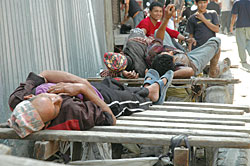 KIRAN PANDAY |
Since the Indian Airlines hijacking ten years ago, every ray of hope that's shone on the Nepali tourism industry has been quickly dashed by disruptive labour strikes or lockouts. Yet the hospitality business continues to be reactive, rather than proactive, in its approach to such problems. It made a big mistake, for example, in succumbing to demands for a service charge. As a result, service in the hotels and restaurants has deteriorated sharply. There is no incentive for people to serve customers better, since they are assured a cut of every purchase. But entrepreneurs who decided against transparency created much doubt amongst their workers as to actual revenues and the fairness of distribution in the first place.
The common man, however, doesn't see the closures forced by labour issues in the proper light. Instead, he wonders: why don't entrepreneurs resolve these problems?
Whenever discussions on the matter take place with multilaterals and consultants, the private sector talks about how labour reform is the most important agenda. Reform, however, hasn't been forthcoming. In the last 15 years, each government has decried unions in public, even as they wink at them in private. Both labour unions and leaders have decided to ignore the bearing labour issues have on the larger economy, as political achievements are considered more important than the welfare of the common worker.
If labour-intensive industries and the hospitality industry don't grow, there is no other place to employ the hundreds of thousands of people that enter the job market every year. If there are no enterprises, there is no labour, so no labour rights. That seems obvious, but since creation of employment opportunities is paramount for Nepal's sustainable growth, it becomes important to bell this cat. Without large-scale enterprises or hotels, investment will continue to chase real estate. But no economy can live just on the value created by inflated prices.
The onus is thus on the private sector to find a solution that protects labour rights without compromising the right to run enterprises. So private sector leaders, can you rise to the occasion?



